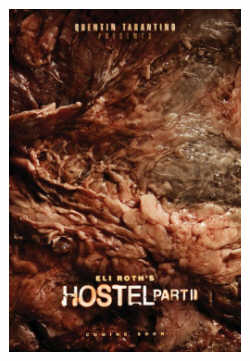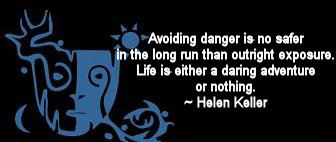|

Hostel: Part II
Review
by Mitch Finn, MA
 Hostel: Part II represents the apogee of torture-porn, the hottest trend in cinema for the last three years, and reaffirms that horror is the most honest genre. Often sequels are some rehash of old material. Horror sequels typically amp up the gore at the expense of any semblance to a successful first story. Eli Roth's sequel plays out not just as a compliment to the first film, but a necessary amplification and deepening of the first film's critique of power and globalization in the new millennium. Hostel: Part II represents the apogee of torture-porn, the hottest trend in cinema for the last three years, and reaffirms that horror is the most honest genre. Often sequels are some rehash of old material. Horror sequels typically amp up the gore at the expense of any semblance to a successful first story. Eli Roth's sequel plays out not just as a compliment to the first film, but a necessary amplification and deepening of the first film's critique of power and globalization in the new millennium.
This sequel starts out mirroring the first film, 2005's Hostel, which followed three frat guy backpackers on a jaunt through Europe looking for wild adventure, good weed, and a great piece of ass. Here the genders reverse, as three young American girls are traveling through Italy on summer vacation. There is the rich one, the pretty one, and the nerdy one. They meet a fourth, a seductive one, at an art class, and she invites the three to come with her to Slovakia where there is a hostel next to the finest hot springs in Europe. Looking for relaxation, they head to the Eastern block country.
Viewers know this is an obvious setup, for the hostel is merely a staging area for a modern tortuary. Elites from the world over wage thousands of dollars on each head. They flock to Slovakia to take part in this grotesque "art exhibit," where they are inducted into an elite hunting club where they maim, brutalize and torture innocents. Roth cuts together a brilliant scene where corporate types are on their computers and iPhones bidding on American girls like they were the hot items on eBay.
A second story line concerns the winners of the auction. Two average American corporate Joes land the prize. Roth fills in the story of the killers with dialog that will remind us of his buddy and mentor Quentin Tarantino, who in Pulp Fiction, gave us a glimpse into the everyday dialog of hitmen before the kill. They talk of how repressed they feel, how weak, how rootless and disconnected they feel. They want to feel something and feel powerful again; or, perhaps, reassert their power in an immediate way rather than in a dissociated way via the corporation.
Hostel: Part II is only temporarily misogynistic. The first Hostel (or, "hostile") film showed that this is an equal-opportunity torture. What is interesting here is that the locale of violence is not portrayed onto a projected unholy other, not in nature, or in the handicapped or misshapen at the margins, but in structural modernity itself. The killers are not the Slovaks, but from "first-world" countries — Americans, Russians, Japanese. This is post-structuralist horror, and Roth bends it to the most nihilistic edge. Here the prevailing symbol of the new horror is the dominant theme of captivity. It is the horror of a society trapped by its own systems, in mazes of indecipherable proportions, wading through the perplexities of an imploding culture.
This trend has been called by critics "torture porn," or "gorn" (gore-porn). We see this in films like House of Wax remake, The Texas Chainsaw Massacre remakes, Turistas, Captivity, and the ongoing Saw series that exploit the theme of helpless victims tortured by an authority who, for either profit, pleasure, or another form of exploitation, gets medieval. The trend is also mirrored in more benign forms, the theme of captivity is strong in films like Children of Men, Stranger than Fiction, and in televison's "Lost," "Prisonbreak," as well as "C.S.I." and its clones.
Torture horror is mirrored in reality television by "Fear Factor," where we see the exact metaphor for the age. Young people in their skivvies crawl into glass coffins and have themselves smothered in snakes — all to earn profit and their fifteen minutes. It exploits our own greed and excess, asking the question, "what's your threshold for humiliation?" It is a mistake to call this trend "torture porn" however, because it is only to note the aesthetics, not the meaning of torture. Rather, a more appropriate term may be corporate porn.
Recall the image of Paris Hilton (who herself played a small role where she is brutally murdered in 2005's House of Wax) in jail this summer, which became the subject of much scrutiny and gossip. The hotel heiress, symbolic of decadent luxuriant artificiality is humiliated by her own captivity, trapped behind the bars that physically represent the antipode of class that Hilton Hotels represent. We experience via proxy how the prison only represents the real prison of celebrity, the ultimate commodification of a human being. However, what is never questioned is the violence the media itself commits in its voracious exploitation of a story.
We Westerners need amplifiers to hear the cry of collective murder, the torture of everyday things. These films are not far fetched contrivances meant to corrupt youth, but an exposé, revealing the truth behind the lies of 24-hour news. Corporate porn is that, expressing the emotional horror behind the blank stare of the news reporter.
This is profit horror, as the prevailing theme is gruesome bodily and psychological harm caused by the psychopathic drift of corporate terrorism. It is alerting the horrors of modernity, giving fictional amplification to not just dog fights, ultimate fighting, Guantanamo Bay, and Abu Ghraib, but to the horror of surveillance, omniscient advertising, identity theft, boob jobs, artificial plants, cubicle workspaces, global worker exploitation, and hegemonic corporate terrorism in its many forms. It is not the horror defending liberal democracy, but precisely losing individual liberty to the oppressive market forces. It is horror's talent to carry the metaphor to its hyperbolic extreme, literalizing the violent act, and taking it as far as the mercurial MPAA will allow.
In the end of the first Hostel, the Final Guy finds escape from Slovokia (if not from his nightmares). The second film begins with the organization finding him and killing him. The sequel ends more hopelessly and tragically. In the old horror, the Final Girl would have been the naïve nerdy one. Not any more. The new victim/heroine is a billionaire heiress who, to escape a murderer's den, buys her way out, herself becoming a killer bent on revenge. She even graphically castrates her captor, symbolizing the appropriation and replication of the negative phallus.
Roth's nihilistic statement — there is no solution to captivity. No exit. The only way to escape the prison is to become a prison guard, to climb to the elite, a larger prison. This brand of horror is not about past traumas, or gender issues, the supernatural, or a confrontation with the primordial through mistakes of science. Money wins in corporate porn. The ideology perpetuates itself, winning over dialog or relationship.
I'm reminded of Prometheus, the Titan who gave man the gifts of knowledge and science, the patron of civilization. Prometheus defied the gods, deprived them of worship, defied Zeus. It is he who, for the act of stealing the divine secret of fire, earned the wrath of mighty Zeus, who chained him to Mount Caucasus with an exposed liver, eagles eating from his side, the organ daily regenerating in a wound which will never heal. It is in this humiliation of the titanic impulse towards ideologies and empty notions of progress that we re-story in corporate horror. It is the penance for the hubris, for defying the gods and nature.
Horror, as always, grinds things down to their essential essence. It breaks down all reason, logic, all notions of progress, all hubris, and brings it into the primal, the immediate. Within the fascination with torture films, underground snuff clips, YouTube decapitations, and so forth, there remains the naïve sentimentality for the real. Is this not merely the expression of the dissociated, disembodied, developed world for grounded reality and a relief from the pressures inherent in a culture of titanic excess?
Roth's next project is adapting the Stephen King novel Cell, (homonym for profit or captivity) a horror about mobile phones, and humanity's place in the exponential growth of technoculture. It will be interesting to see where corporate porn will lead as trends evolve — will captivity continue to trend in media, or will there be some release? What shift in the culture might this signify? And into what? After what amount of torture will Prometheus be freed?
Mitch Finn, MA, Mitch Finn, MA, is a psychotherapist practicing in Houston, and is currently a doctoral candidate in Mythological Studies at Pacifica Graduate Institute. His masters thesis, Lessons from the Dark: Trauma and Soul Retrieval in Horror Cinema, examined the cultural fascination with horror mythopoesis.
Read more by Mitch Finn at his website mitchfinn.com
Read Bluebeard by Charles Perrault
Return to Passages Menu
Subscribe to the Passages e-zine
|

